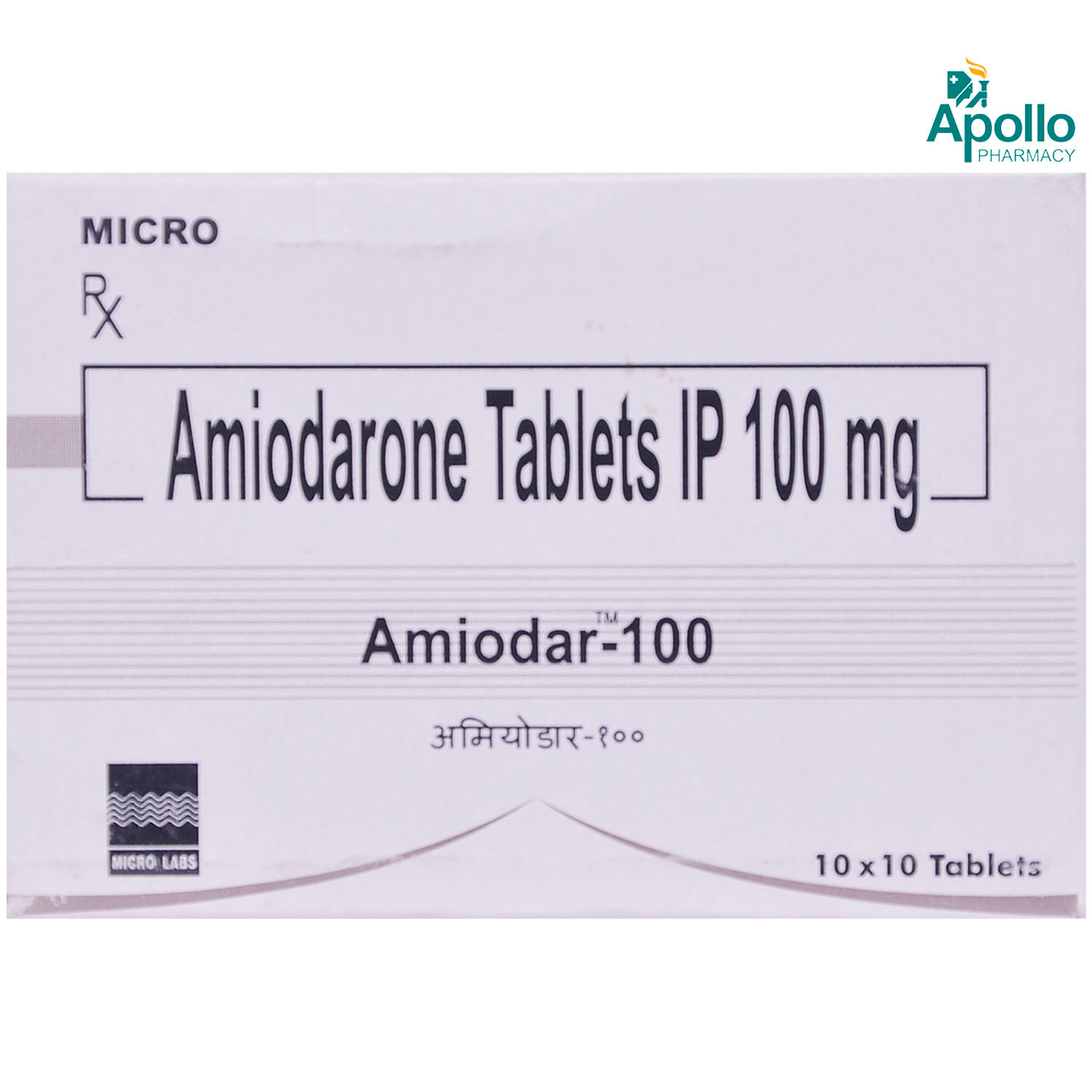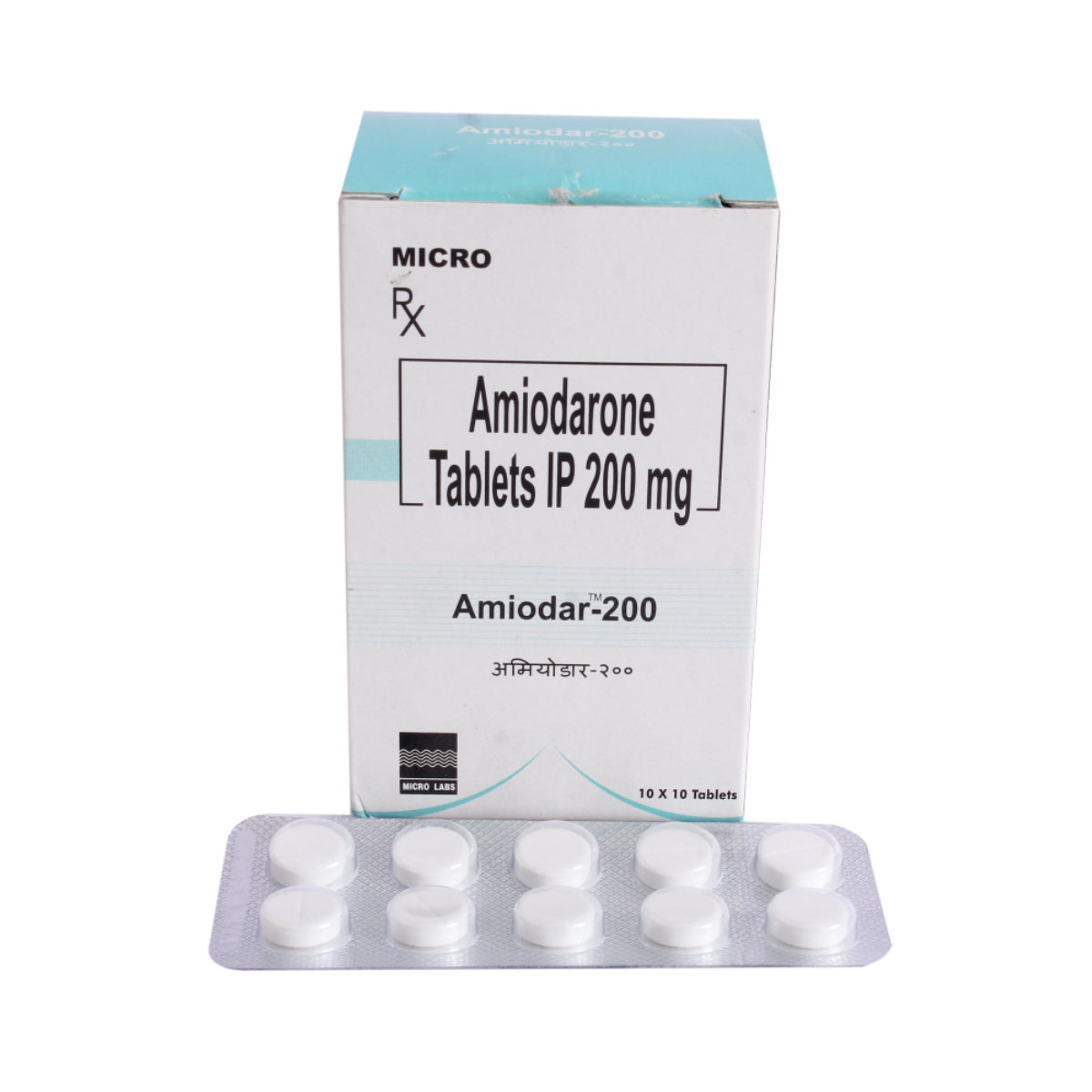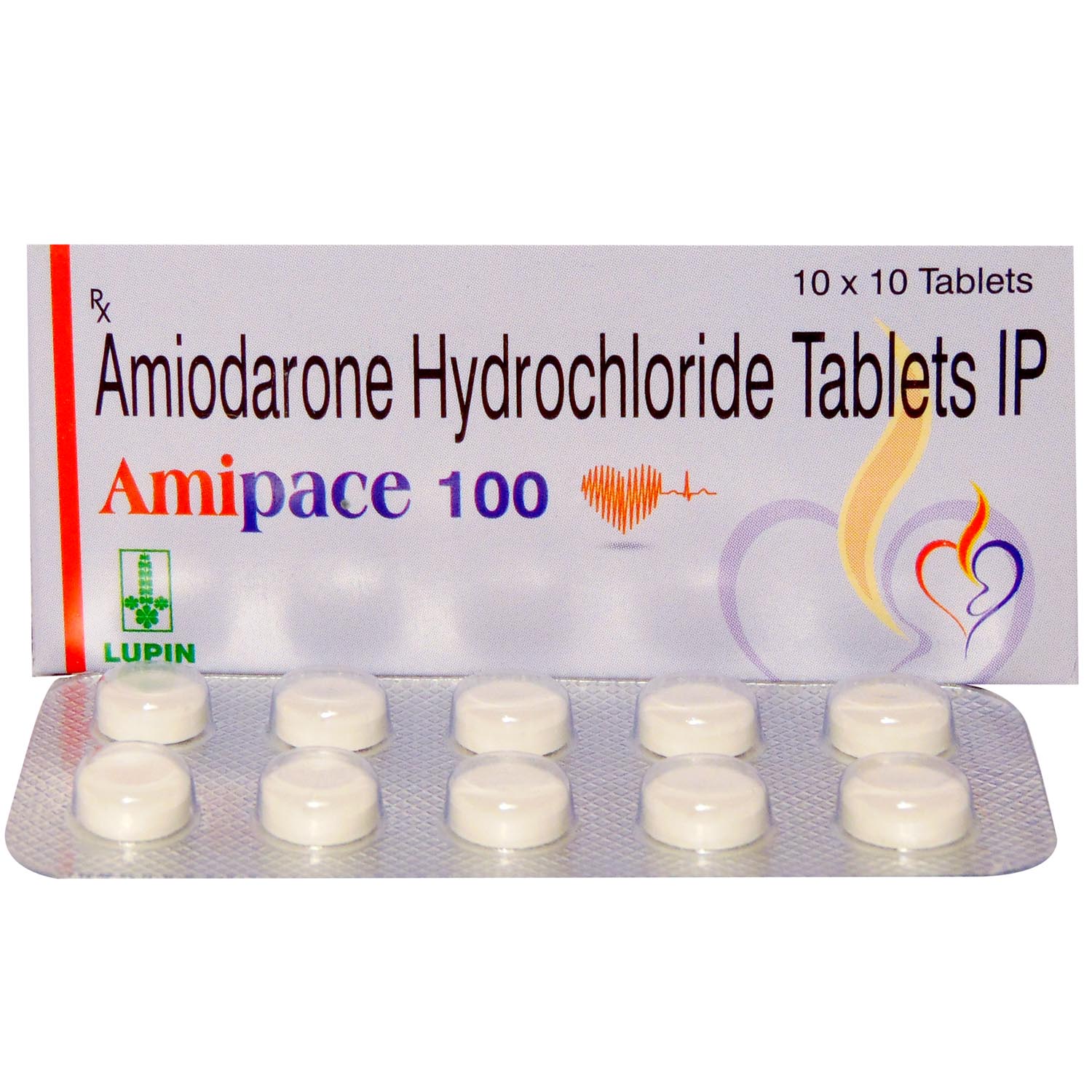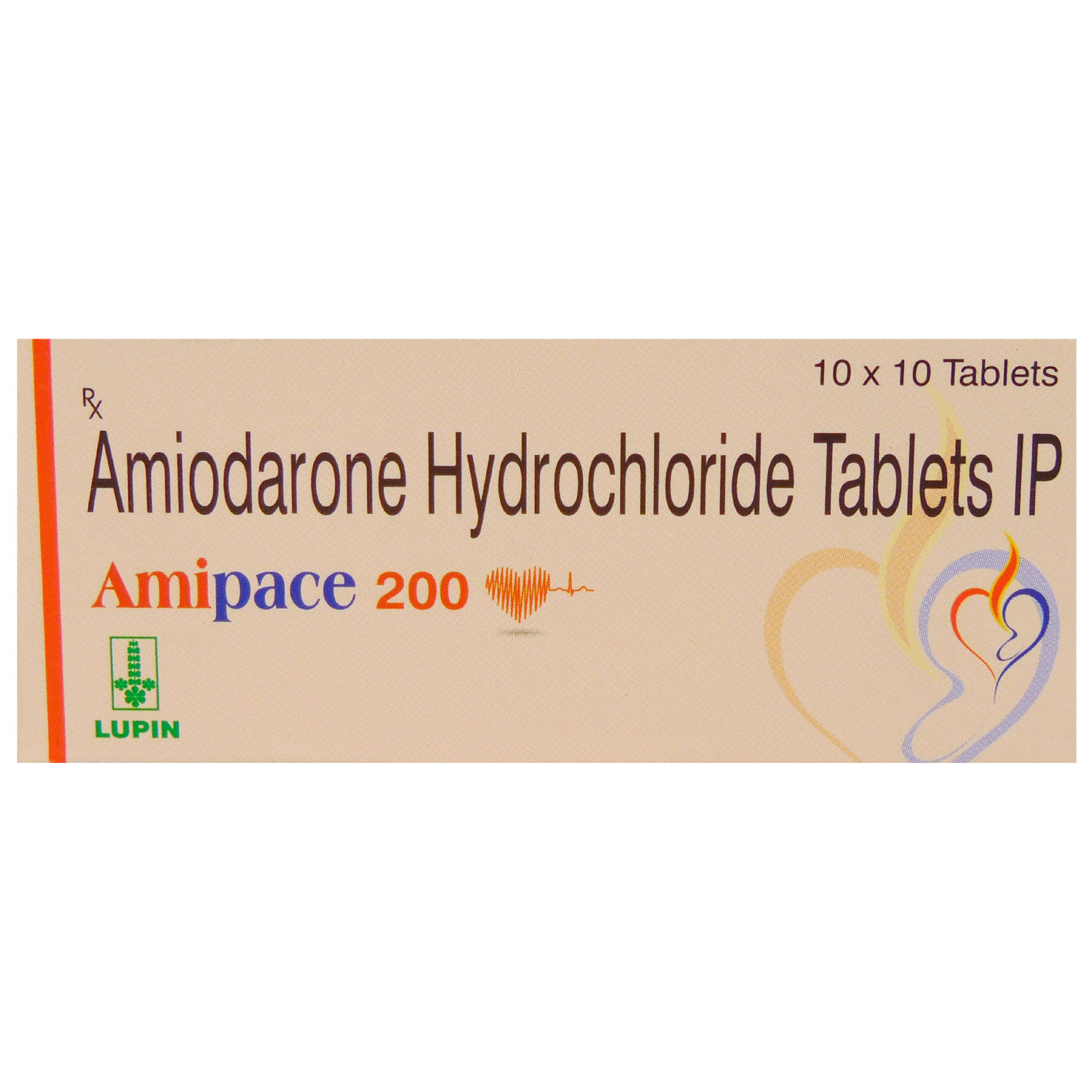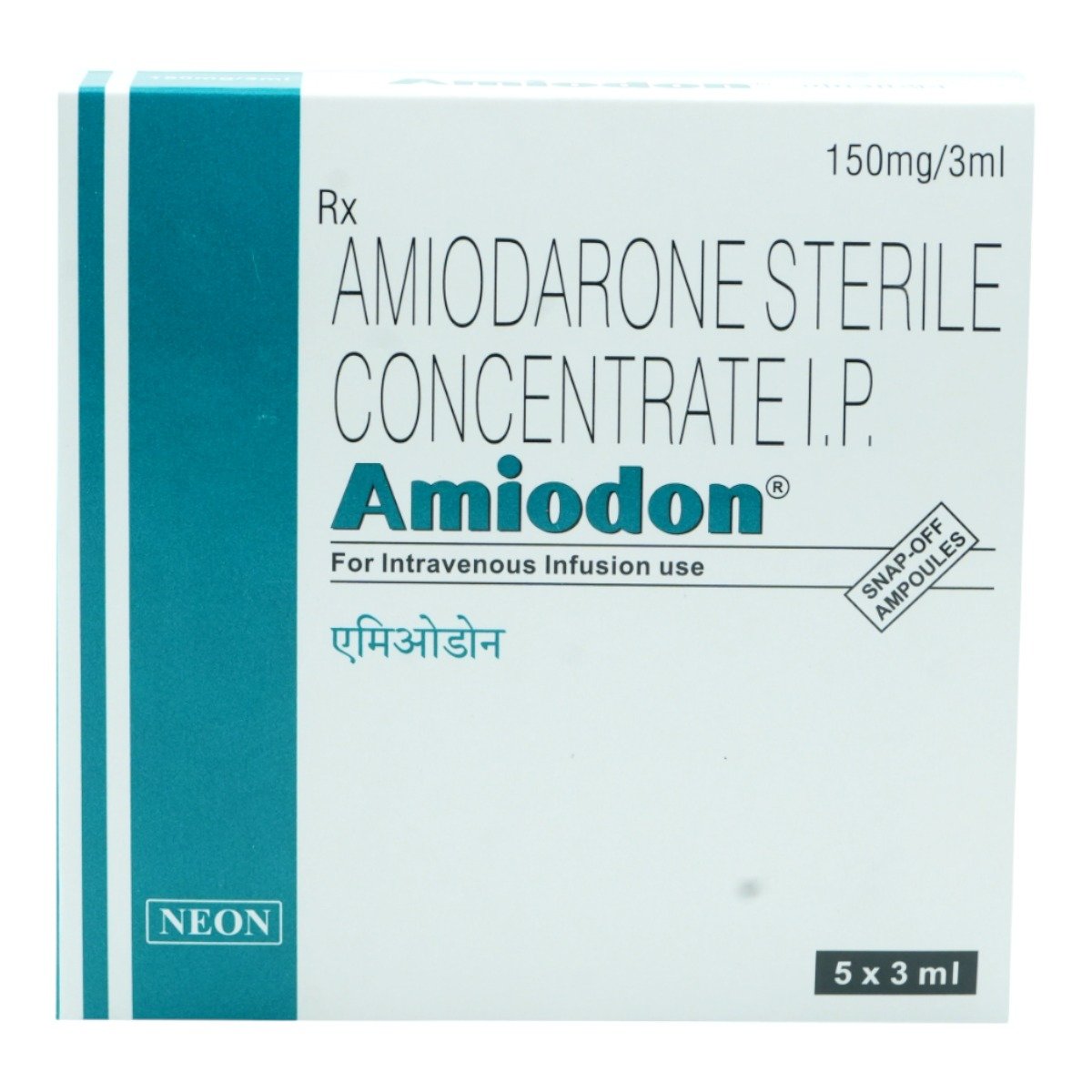Amiodarone
About Amiodarone
Amiodarone comes from a class of drugs called 'anti-arrhythmic. Amiodarone used to treat an illness called Wolff-Parkinson-White Syndrome. This is where your heart beats unusually fast. And also treat other types of fast or uneven heartbeats known as' atrial flutter' or' atrial fibrillation'. Taking the tablets helps your heartbeat to return to normal. Amiodarone Tablets are used only when other medicines cannot be used. Atrial fibrillation is a condition in which two upper chambers of the heart (the atria) beat without coordination. Wolff-Parkinson-White Syndrome is a condition in which an extra electrical pathway between the upper and lower chambers of the heart causes a rapid heartbeat.
Amiodarone contains 'amiodarone' that controls the heart's uneven beating (arrhythmia) or prevents irregular heartbeat. It blocks the potassium channels and reduces the impulses that cause abnormal heartbeat.
Common side-effects of Amiodarone are blurred vision or visual halos around light. Amiodarone may affect thyroid gland function. It may also cause skin photosensitivity (redness or rashes on the sun-exposed skin, especially the face) and tremors when you move your arms or legs. Consult your doctor if any of these effects persist or worsen over time.
Do not take Amiodarone if you are allergic to iodine, amiodarone, or any other anti-arrhythmic drugs. Do not take this medicine if you have atrioventricular (AV) or sinoatrial (SA) heart block (disorders in the rhythm of the heart), unless you have a pacemaker or a history of sinus bradycardia (slow heartbeats), or if your heart cannot pump blood properly. Amiodarone contains iodine and lactose. So, inform your doctor if you have lactose intolerance or any thyroid problems. Do not take Amiodarone if you are pregnant or breastfeeding. Do not take alcohol as it may worsen the condition. Do not use it in children unless prescribed by your doctor. Inform your doctor if you have skin diseases as they can cause skin photosensitivity.
Uses of Amiodarone
Medicinal Benefits
Amiodarone contains ‘amiodarone’, which belongs to the class of ‘antiarrhythmic drugs. It acts by blocking the potassium channels in the heart. Irregular heartbeat occurs due to abnormal electrical activity or the impulses produced in the heart. Amiodarone blocks these abnormal electric signals and regulates the heartbeat.
Directions for Use
Storage
Side Effects of Amiodarone
- Extreme restlessness
- Weight loss
- Sweating
- Sensitivity to heat
- Hyperthyroidism (increase in thyroid hormone)
Drug Warnings
Do not take Amiodarone if you are allergic (hypersensitive) to iodine, amiodarone hydrochloride, or any of its other ingredients of it. Do not take if you have sinus bradycardia (slower than normal heartbeat), sinoatrial (SA) or atrioventricular (AV) heart block (abnormal heart rhythm) and do not have a pacemaker fitted, taking certain other medicines which could affect your heartbeat, are pregnant or breast-feeding. Amiodarone contains lactose, so patients having lactose intolerance should not take it. Inform your doctor if you have age above 65 years, have liver problems, lung problems such as asthma, optic neuritis (eye problem), or are undergoing surgery. Inform your doctor if you have stevens-Johnsons syndrome (flu-like symptoms followed by rashes and blistering of the skin) or toxic epidermal necrolysis (a serious skin condition characterized by flu-like symptoms, chills, followed by rashes and peeling of the skin) as Amiodarone can cause skin sensitivity and worsen the condition.
Drug Interactions
Drug-drug interactions: Amiodarone may interact with other medications used to treat atrial fibrillation (digoxin and diltiazem), anticoagulant (warfarin), diuretic (furosemide), antibiotic (levofloxacin), analgesic (oxycodone), lipid-lowering drug (simvastatin), and antidepressant (trazodone).
Drug-food interactions: Amiodarone may interact with grapefruit juice and caffeine and increase the risk of side-effects. Amiodarone may interact with alcohol and increase the side-effects associated with the liver.
Drug-disease interactions: Amiodarone should be used with caution in patients with proarrhythmic effects (medication-induced side-effects), undergoing dialysis (a procedure to purify blood in kidney failure patients), pulmonary dysfunction (lung problems), sinus node dysfunction (irregular heart rhythm), visual impairment, and cardiovascular dysfunction (heart problems).
Drug-Drug Interactions Checker List:
Safety Advice

Alcohol
unsafeAmiodarone may interact with alcohol and worsen the liver problems. So, it is recommended to avoid alcohol intake while using Amiodarone.

Pregnancy
unsafeAmiodarone is a category D medicine. It shows harmful effects on the fetus when given during pregnancy.

Breast Feeding
unsafeAmiodarone may be excreted in breast milk in small amounts. So, it should be avoided in breastfeeding mothers.

Driving
cautionAmiodarone may cause vision problems. So, avoid driving or operating heavy machinery after taking Amiodarone.

Liver
cautionAmiodarone may show an effect on the liver. So, it should be used with caution in patients with liver problems.

Kidney
cautionAmiodarone should be used with caution in patients with kidney disease only when prescribed by a doctor.

Children
cautionAmiodarone should not be used in children below 12 years of age unless prescribed by a doctor.
Habit Forming
Diet & Lifestyle Advise
- Protect your skin from sunlight while taking this medicine and for a few months after finishing the course of the treatment. Apply sunscreen lotion that has high SPF (sun protection factor). Cover your face, arms, and legs while going outside.
- Do not drink grapefruit juice as it may increase the risk of side effects.
- Limit caffeine intake.
- Avoid intake of alcohol as it worsens the condition by increasing the risk of liver problems.
- Quit smoking.
Special Advise
- If you are previously diagnosed with thyroid problems, your doctor should test your thyroid function before giving you this medicine.
Patients Concern
Disease/Condition Glossary
Atrial flutter or atrial fibrillation: Atrial fibrillation is a condition in which upper chambers (the atria) beat out of coordination with lower chambers (ventricles) of the heart. It causes poor blood flow into the heart. Symptoms include palpitations (racing or pounding heart), shortness of breath, and tiredness.
Wolff-Parkinson-White (WPW) Syndrome: WPW syndrome is a condition in which the upper and lower chambers (ventricles) of the heart cause rapid heartbeat because of an extra electrical pathway present between them. This condition is present at birth. Symptoms include rapid heartbeat (tachycardia) and dizziness.
FAQs
Amiodarone is an antiarrhythmic drug used to treat arrhythmias (irregular heartbeat). It acts by blocking the potassium channels in the heart and slows down heart activity. It blocks the abnormal electrical activity in the heart and normalizes the heartbeat.
Do not take grapefruit or grapefruit juice, coffee, and alcohol while taking Amiodarone as it increases the risk of side-effects. Do not take other medicines unless prescribed by your doctor.
Amiodarone has a toxic effect on the thyroid and may cause thyroid dysfunction. So, people with hypothyroidism should not take Amiodarone.
Do not take Amiodarone if you are pregnant as it may cause toxic effects to the fetus.
Prolonged use of Amiodarone may cause toxic effects. However, your doctor may prescribe for the long-term if the benefits outweigh the risks. It may also cause proarrhythmic effects when used long-term. Proarrhythmic effects are the medication-induced occurrence of pre-existing arrhythmias.
Wolf-Parkinson-White (WPW) syndrome is a condition in which the upper and lower chambers (ventricles) of the heart cause rapid heartbeat because of an extra electrical pathway present between them.


